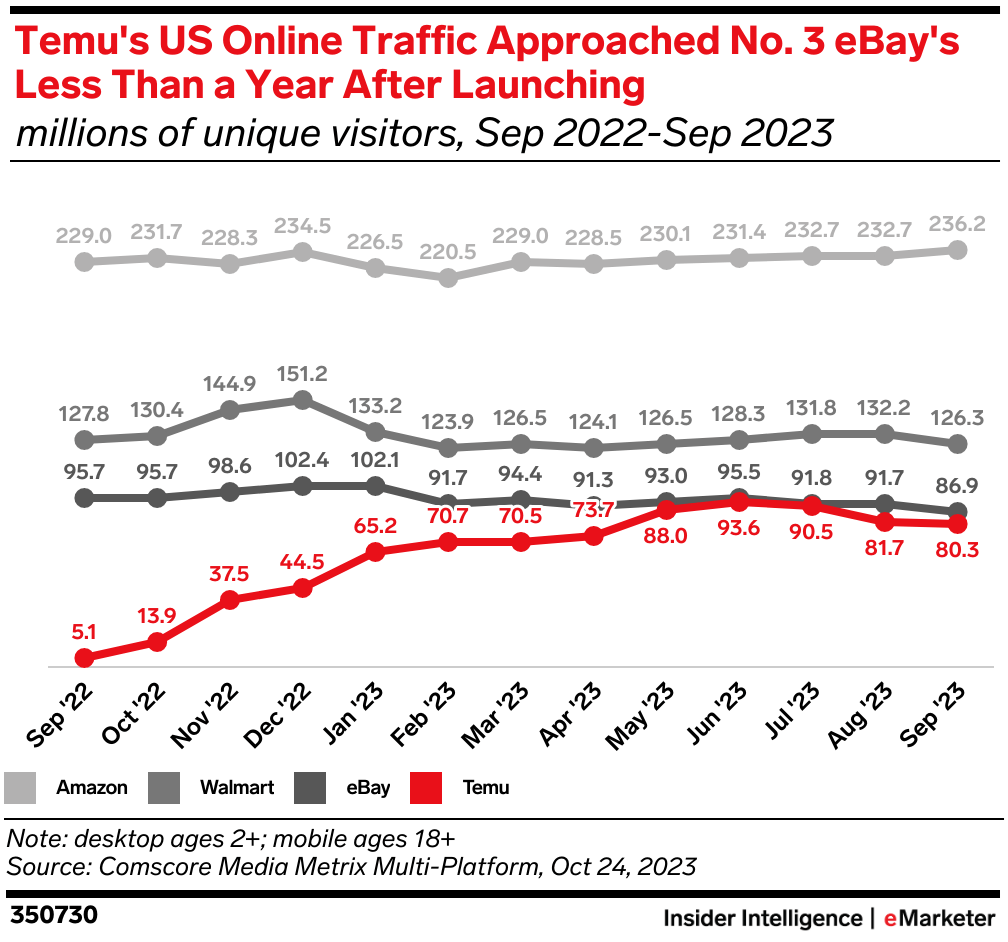
For several years, small businesses have fought against the rise of counterfeit versions of their products popping up on Facebook, Amazon, Shein and other shopping platforms. Last year, three independent designers sued Shein for selling “exact copies” of their work.
This problem now appears to extend to Temu, the Chinese retail platform that has emerged as a retail juggernaut over the last two years. Temu hosts sellers who export clothing, electronics and other products straight from warehouses on the cheap. The platform is consistently at the top of the Apple App Store charts, and its parent company Pinduoduo raked in $9.6 billion in the third quarter of 2023, beating estimates by 25%. But some small- and medium-sized creative business owners believe that Temu’s rise is coming directly at their expense—and is plagued by the same infringement issues as their competitors. Not only do they say that Temu can offer prices that they are unable to, but many have found near-identical versions of their product designs being sold on Temu at those much lower prices.
“When Temu started getting a lot bigger in 2022, immediately, clients were getting ripped off,” says Andrea Sager, a lawyer who has helped dozens of small businesses file letters of complaint against Temu. “And it’s just been getting worse and worse.”
A Temu spokesperson responded to these complaints in a statement, writing: “At Temu, we understand the importance of intellectual property rights, especially for small business owners and creators who are the backbone of innovation and creativity. We recognize that, despite our efforts, there is room for improvement. Currently, the volume of complaints we receive daily from small businesses is low. We take each report seriously and strive to respond promptly and effectively.”
Temu was launched in 2022 by the Chinese e-commerce company Pinduoduo, which previously found success in China selling heavily discounted products straight from manufacturers to low-income buyers. Temu quickly captured a global customer-base thanks to its rock-bottom prices and gamified elements. As of October, it was the fourth most-visited retail site in the U.S., according to Comscore. Customers can earn credits through spin-the-wheel games or by convincing their friends to join. As of October 2023, the app had been downloaded at least 223 million times, with 43% of its monthly active users coming from the U.S., according to a Morgan Stanley report.
Temu, like Amazon, acts as a digital storefront for companies that sell their own wares. (Amazon also makes its own products.) This has allowed third parties, many of whom operate in China, to scour the web for trendy designs and then list them on Temu at a discount. While many designs are quickly taken down if the designers complain, similar items often pop back up in another digital storefront, vendors say.
Leora Aileen is a small business owner who lives in the Netherlands and creates illustrated tote bags, bookmarks and other book-related content. For months, her most popular product was a tote bag she illustrated inspired by The Reader tarot card, for €13.99. Aileen sold hundreds of bags on her own website, and then decided to discontinue the product in order to promote new designs.
But in July, one of her customers alerted her that identical “The Reader” tote bags had popped up on Temu and Shein for less than €6. Temu’s website said that more than 200 of the bags had already been sold, with customers commenting on the bags’ quality.

“I felt worthless and powerless,” she says. “It’s very frustrating when you work so hard and pour so much creativity into designing something; you work so hard for every single sale. And then somebody just goes and lifts your design off a photo.”
Read More: Shein Faces Lawsuit Over Copyright Infringement. Here’s What to Know
Aileen filed a complaint to Temu’s intellectual property protection team and the listing was taken down. But a few weeks later, another version popped again from a different Temu vendor. This version was listed for €5.38, and the listing said 741 bags had been sold.
To add insult to injury, Aileen says that Temu has messaged her several times since her complaint, asking her to join the company’s influencer program, in which people can get paid for promoting Temu on social media. “I don’t think they realize I’m also an artist they’ve taken from,” she says.
When presented with Aileen’s complaint, a Temu spokesperson wrote: “We will ensure more comprehensive checks are in place to avoid any oversights and to be more sensitive to the individuals we contact.”

TikTok, Instagram and Reddit are filled with complaints from business owners who say their designs have popped up on Temu without their consent. Jessi Roberts, the founder and CEO of the Idaho-based retailer Cheeky’s, has had a similar experience. Roberts employs a design staff to create the brand’s own T-shirts, jewelry and other accessories. But recently, Roberts says, the company’s products—logo and all—have been popping up on Temu shortly after being listed on the Cheeky’s site. “To see our earrings being sold for $1.99 with free shipping: it guts you,” she says.
A Temu spokesperson said that the jewelry bearing Cheeky’s logo and designs were removed from their website on Jan. 7.
Roberts says that her designs appear on many other e-commerce sites across the web, and that she works with lawyer Sager to file complaints to get the listings removed. “We’re able to get them taken down off eBay, Amazon and Etsy,” Roberts says. “But the sites I can’t control like Temu—I can’t get them off of those.”
Read More: Shopping Scams on Facebook Are Ripping Off Thousands of Customers
Many of the digital storefronts that sell stolen designs have proved exceedingly hard to track down. Sager says that many of them are hidden behind layers of companies, and that any money eventually awarded to small businesses usually isn’t worth the pursuit of time-consuming and expensive lawsuits. “I tell clients that 99% of the time, we're not going to make any money by pursuing these people for infringement,” she says. “The goal is to just get them removed.”
Ironically, Temu itself is now facing copycat vendors. In November, it won its first lawsuit in an injunction against 20 website domains that Temu argued contain counterfeit lookalike marketplaces designed to “deceive customers.”
The issue of intellectual property has become one battle in a rapidly-escalating war between Shein and Temu, who are competing for similar global consumer bases. Both have filed lawsuits against each other. While Shein has been sued for copying the designs of small business owners—and now also the huge Japanese retailer Uniqlo—it has accused Temu of doing the same. A Temu spokesperson, in an email to TIME, claimed that more than half the complaints it has received about copyright infringement from small business owners are actually being backed by rival Shein.
“Shein has mobilized merchants under their control, using small and medium-sized enterprises as fronts to file complaints against us,” the spokesperson wrote, adding that the complaints served as attempts to “abuse the judicial system by filing frivolous lawsuits to smear us.”
Amid this feud, both companies are growing rapidly. Shein made $24 billion in revenue in the first three quarters of 2023, a 40% increase compared to the same time frame in 2022, The Information reported. Meanwhile, Temu rocketed past Shein in terms of unique visitors in the U.S. in late 2022 and is now the fourth most-visited retail site in the U.S. behind Amazon, Walmart and eBay, says Sky Canaves, a senior analyst at the data analysis firm Insider Intelligence.
The platforms’ cut-rate prices have driven down consumer price expectations to unreasonable levels, says Douglas Schmidt, a computer science professor at Vanderbilt University who researches digital privacy. “Especially in a struggling economy, most people just want a good deal,” he says. “It’s making it more difficult for domestic vendors to compete in an international world.”
Roberts, the CEO of Cheeky’s, says that she has received feedback from customers who tell her that her prices should be the same as Temu’s. “They feel like small businesses are marking the price up unfairly,” she says. “They don’t understand that a lot of these products we actually designed and created.”
More Must-Reads from TIME
- Cybersecurity Experts Are Sounding the Alarm on DOGE
- Meet the 2025 Women of the Year
- The Harsh Truth About Disability Inclusion
- Why Do More Young Adults Have Cancer?
- Colman Domingo Leads With Radical Love
- How to Get Better at Doing Things Alone
- Michelle Zauner Stares Down the Darkness
Contact us at letters@time.com